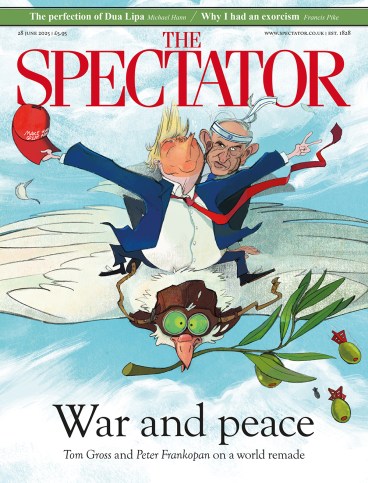
One peril of a sudden adverse turn of global events is that it provides cover for bad domestic government. If confidence is knocked by fear of war, if inflation blips because the Strait of Hormuz is blocked, if demand for defence spending sends budgets awry, voters may easily be persuaded that Middle East conflict, rather than Labour policy, has put the UK economy flat on its back.
But that’s no excuse for proceeding with bad legislation as the world darkens – and one such item is Angela Rayner’s Employment Rights Bill, currently under House of Lords scrutiny, which in brief summary confers fearsome powers on trade unions and creates a ‘Fair Work Agency’ to interfere in business in all sorts of other ways.
The government says this might add £5 billion to business costs ‘which will largely represent a transfer to the lowest paid in society’; but the hidden impact on companies’ willingness to invest, create jobs and drive growth will surely be much greater. Shadow business and trade secretary Andrew Griffith has urged private-sector employers not to let themselves be ‘sleepwalked to disaster’ as the bill passes into law. Read the small print and weep: he’s absolutely right.
Bezos go home
My invitation to the wedding in Venice of multibillionaire Amazon founder Jeff Bezos to Lauren Sánchez went astray. Either that or I’m still blacklisted, following an episode some years ago when I was ejected from a tour of the online retailer’s Seattle HQ after its database spotted me as a potentially hostile journalist. Either way, perhaps I should have headed uninvited for the island of San Giorgio Maggiore where the ceremony was due to take place – and if the heavies wouldn’t let me ashore, I could have joined anti-Bezos banner-wavers in St Mark’s Square.
Local hostility to this $10 million extravaganza is an expression of the anti-tourist movement that began last summer in crowded resorts from the Costa del Sol to Hawaii. Understandable though it may be in Venice, where tourist beds outnumber residents and cruise ships tower over crumbling waterfronts, it defies economic logic to protest against 200 big-tipping visitors in town for a three-day bash. But it speaks eloquently to a bitter mood of populist xenophobia in which the globetrotting haves still believe they represent trickledown in action while the low-waged have-nots who serve them feel exploited and invaded.
That being so, Bezos would have been safer and wiser to book a venue closer to home, where conspicuous cash-splashing is still celebrated rather than resented: the Venetian Resort Las Vegas even offers a gondola and a fake canal.
School’s out
As summer term ends, the cataclysm of the independent schools sector intensifies. Upwards of 20 schools have closed following Labour’s imposition of VAT on fees and removal of charitable business-rate relief; dozens more have joined defensive mergers or are urgently seeking them. The government cared nought for the disruption these measures would cause families affected (but then apparently neither did the wider voting public), while its airy claim that a net tax take of £1.5 billion would pay for more state-school teachers remains untested and largely unchallenged.
All we know is that private education will emerge entirely reshaped from this Darwinian upheaval, with many more extinctions and some mutant births. On which theme, here’s news of my own alma mater, Glenalmond in Perthshire, founded by William Gladstone in 1847 and now entering a new era under the auspices of ‘35 Education’, an enterprise founded this year by a Turkish businesswoman, Professor Basak Akdemir, who has the backing of Dr Khalid bin Mohammad Al Attiyah, a former deputy prime minister of Qatar, and an ambition to replicate Glen-almond’s model in ‘select overseas markets’. A Times report headlined ‘top Scottish private school bought by Qatari’ provoked a hot denial from the newly appointed ‘executive principal’, Lucy Elphinstone, but the terms of this financial partnership are so far obscure.
I think of my kilted teenage self striding through winter weather to Sunday chapel and I think of the prize-giving speech I’ve given elsewhere about how the solemn temples of adult life dissolve but your old school always seems to be pretty much the same. Not any more. ‘Dramatic change is ahead,’ says Glenalmond’s press release: across a sector in which the UK leads the world but which Labour has casually set out to wreck, that’s a sad understatement.
Sparkling growth
In deep France for a break, I’m diverted from bulletins about Iran to the parable of this year’s en primeur claret sales. Bordeaux winemakers made out like bandits when the Chinese started buying their products and even their entire vineyards at grossly inflated prices – and the wines of top châteaux became tradeable investments rather than drinking pleasures. Fifteen years on, demand from departed Chinese and tight-pursed western consumers has shrivelled, the young drink far less than their parents, the concept of buying en primeur (long before the wine is ready to drink) is out of fashion, and new wine prices have been slashed as mature claret values have slumped.
But while Bordeaux’s greedy vignerons harvest their self-inflicted grief, the English wine industry, which barely existed a generation ago, grows apace – a remarkable efflorescence of patient, science-based, market-savvy business-building that I’d love to see reflected in this year’s Spectator Economic Innovator Awards. My latest discovery is a light sparkling rosé called Sidonia, from vines planted on a former apple orchard near Ross-on-Wye: production is small so far but at less than £20 a bottle it’s a bargain, a talking point for summer parties and a modest beacon of British entrepreneurship.








Comments